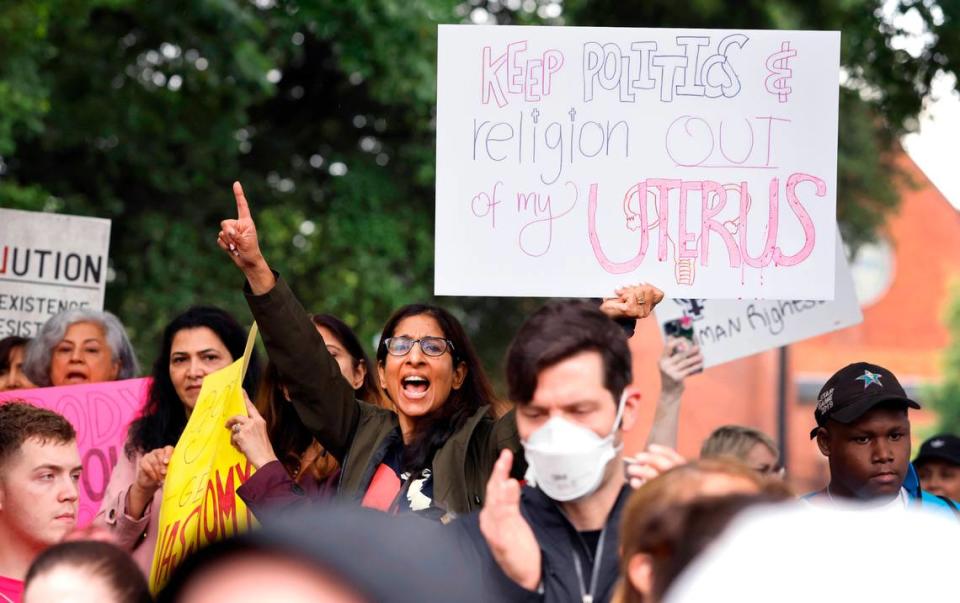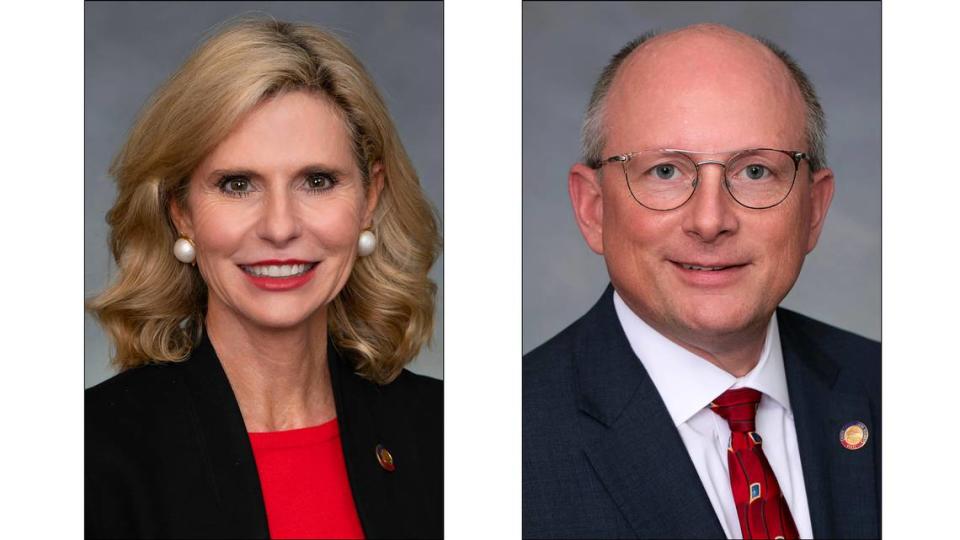Not taught in medical school: How to be a doctor and a politician
Before the North Carolina legislature passed a bill barring gender-affirming care for minors in late June, a group of demonstrators gathered in front of the legislative building to protest.
One by one, activists took to a podium planted in front of the crowd to tell the legislature to reject the bill. But another message echoed during the demonstration — in the signs the protesters held.
One woman held up a hand-drawn sign that read: Politicians, stop playing doctor!!
Another woman in the crowd waved a sign saying: Trust doctors, not politicians.
Opponents to North Carolina’s 12-week abortion law, which was passed in early May, made similar requests. Across the country, opponents to restrictions on abortion and gender-affirming care have repeatedly called on state legislatures to stay out of medical decisions.
But the conflict between politics and medicine isn’t new, said UNC social medicine chair Jonathan Oberlander. Health care and medicine have always been intertwined with politics in the United States, he said, citing COVID-19 vaccine mandates, the Affordable Care Act and providing general health funding as a few examples.
“I think a lot of it is, we’re repeating history, and we’ve just forgotten that history,” he said.
What might be different about the most recent political disputes on health-related matters, from Oberlander’s perspective, can be attributed to growing “hyperpartisanship and polarization,” which has been reflected in several national polls over the last decade.
“We live in an increasingly divided country,” Oberlander said. “Medicine is not immune from that divide.”
And there’s “more partisan edge” to come, he said. Recent N.C. legislation on abortion and gender-affirming care could be some of the newest examples.
The way those new laws limit health care isn’t something many doctors are accustomed to, said Mara Buchbinder, also a UNC social medicine professor. Now some physicians have to decide whether to provide what they consider to be standard care or follow state law, she said.
“This idea that the government is going to decide what is appropriate care for your patient, I do think that’s probably a fairly novel idea,” Buchbinder said.
Dealing with politics and politicians is rarely taught in medical school, some doctors say, but at least since the start of the COVID-19 pandemic it has become increasingly unavoidable.

Politics could be ‘nail in the coffin’ for some physicians
Doctors are very aware of their political situation, which Buchbinder observed in her research on physician stress during the pandemic. In multiple instances, doctors didn’t just explain to Buchbinder that politics affected them — they said it weighed on them.
Between early 2021 and mid-2022, Buchbinder and other research colleagues interviewed 145 frontline physicians about their pandemic experience in four U.S. cities — New York City, New Orleans, Miami and Los Angeles.
Politics were an inescapable topic for physicians in all four cities. Some in New York City and Los Angeles said they felt grateful to live in “areas that took the pandemic seriously,” she said. But many doctors in Florida reported it being a difficult environment to practice in because Gov. Ron DeSantis “wasn’t taking the pandemic seriously.”
The seeds were already planted for medicine to become more politicized before the pandemic, Buchbinder said, but COVID-19 was the tipping point. The pandemic completely altered patients’ responses to their physicians, she said, which was exemplified by some people’s resistance to COVID-19 vaccination efforts.
Eric Westman, a Duke University medical professor, became very familiar with the animosity around COVID-19 when he received an anonymous letter from Cedar Rapids, Iowa, about half a year into the pandemic.
He had wrapped up a study with his colleague Martin Fischer on the efficacy of wearing a mask to prevent the spread of germs. Their conclusion — that some masks worked well at stopping particles from passing through — aligned with the advice of top health organizations like the Centers for Disease Control and Prevention.
The anonymous writer didn’t take a liking to Westman’s study.
The letter closed with the writer’s take on masking: “It’s basically used in certain areas to terrorize the public. You’re probably OK with all that.”
Westman was used to getting “cards of gratitude” from former patients, he said. But hate mail was something new.
“It got so politicized so fast that someone wrote me a letter,” Westman said.
For doctors, is political involvement a ‘professional obligation’?
When legislative politics reaches into the medical field, the North Carolina Medical Society is one organization that looks to represent “the interests of medical professionals and patients,” according to its website.
Chip Baggett, the medical society’s CEO, sees relationship-building between elected officials and doctors as part of the organization’s role.
He has regular meetings with elected officials, he said, and part of his job is making sure there’s “a representative voice in the room” for doctors. The medical society’s main goal is preserving the patient-physician relationship, so if legislation affects that, the group will speak up, he said.
It doesn’t have “a single consistent voice,” he said, because it can’t speak on behalf of all doctors’ viewpoints. So the medical society tries to speak with a voice that is “representative of most physicians.”
Despite the conflicts over abortion and gender-affirming care restrictions, Baggett said he doesn’t think the relationship between medicine and politics is more difficult — there’s just more overlap now.
“I’ve been at this for a long time, so I play a long game,” Baggett said. “These things have a way of reaching crescendos and then falling by the wayside and then coming back up again later.”
There are risks to medical organizations taking a more active role on controversial medical topics, said Howard Eisenson, a Duke University consulting family medicine professor. But being vocal on issues is part of a doctor’s “professional obligation,” he said, and it requires more courage from medical organizations that represent the health care community.
“If we’re going to engage more broadly around issues of importance, we’re going to have to risk some uncomfortable conversations and perhaps even alienating people,” he said.
Although newer in his role as president of Healthcare for All North Carolina, an organization that advocates for universal single-payer health insurance, Eisenson said it’s been satisfying not just “sitting on the sidelines.” When Eisenson, who is now 70, was in medical school, he said, there wasn’t much instruction on how politics could impact his profession.
Now in a teaching role at Duke, he said the medical students he’s met are becoming more engaged in politics. He’s been encouraged by that development, and it makes him feel more hopeful about the future of medicine.
“When we’re silent, when we don’t speak out about issues of importance and leave the speaking out to others who are often much less informed, we do a public disservice,” Eisenson said.
When doctors run for office
State Rep. Timothy Reeder shares Eisenson’s sentiment on physicians being more politically involved — it’s a large part of why he decided to run for office. There aren’t enough medical professionals in the North Carolina legislature to guide health legislation, Reeder said, so he wanted to contribute his expertise.
“I believed that having another voice for health care and physicians in the practice of medicine and our patients was going to be very valuable at the General Assembly,” said the Pitt County Republican, who is also an emergency physician.
State Rep. Kristin Baker is the only other physician in the legislature. She’s a psychiatrist who describes herself as “a pro-life Christian, lifelong Republican” on her campaign website.

A call from former Rep. Perrin Jones, an anesthesiologist who held Reeder’s seat previously, ahead of the midterms presented Reeder with an opportunity to join the state House. It wasn’t on his agenda originally, but he was “looking for a career change” and went for it, he said. He defeated his Democratic opponent Brian Farkas by a thin margin of 1.2% in 2022.
His approach to his new role as a state representative has centered around leaving complicated medical decision-making between the physician and the patient, he said.
But Reeder voted in favor of North Carolina’s 12-week abortion law and the ban on gender-affirming care for minors. He spoke on behalf of Senate Bill 631, a bill barring public health care facilities from providing gender-affirming care to minors, which was later incorporated into the current ban.
Activists and Democratic lawmakers criticized the bills as government intrusions into private medical decisions.
Reeder said the abortion bill was a “good compromise,” and said many North Carolinians would agree abortion needs some restrictions.
In a June Elon University poll, 45% of North Carolina respondents said they strongly or somewhat opposed the 12-week abortion law. That was nearly 10 percentage points higher than those who supported the change.
His decision on the gender-affirming care bill came down to stopping a medical practice he thinks could “potentially be harmful” for children, he said.
Several medical associations, including the American Academy of Pediatrics and the American Medical Association, have released statements over the past two years deeming bans on gender-affirming care for minors as “dangerous.”
Outside of the more controversial health issues to make their way through the legislature, legislators have turned to Reeder for help understanding certain health care issues, he said. Through that collaboration, he’s given advice on how some health-related bills would affect a medical practice, Reeder said.
“I know how some of those things happen and hit the front lines,” Reeder said.
A culture of not challenging authority
For better or worse, doctors hold a lot of social capital, said Dona Murphey, one of the founders of Doctors in Politics, a political action committee that supports medical professionals running for office. People listen to their opinions, she said, but instead of using that power, many doctors choose to stay politically uninvolved.
“It’s unfortunately a part of a culture of medicine to not challenge authority,” Murphey said. “It’s how we are raised within the profession.”
Her experience as a neurologist convinced her to help found Doctors in Politics. She witnessed time and time again incidents where she felt the health system failed her patients, she said, and she wanted to be part of the movement to change that at the political level.
She ran for a Texas school board member seat in 2019 and lost, but she continues to work with Doctors in Politics to encourage more medical professionals to engage in politics. The group is merging with another PAC, Healthcare for Action, ahead of the 2024 elections.
Working rigorous full-time jobs makes political involvement difficult for doctors, Murphey said. Running for office can be a risk to doctors who feel they have more stability within their practice. But the group has seen more health care workers verbally commit, she said.
Many doctors hold identities that are directly impacted by legislation, Murphey said, which makes some feel they need to join political movements “out of necessity.”
“It’s really important for people to appreciate that and understand that probably at some level for every discriminatory policy, that is probably impacting you in some pretty direct way,” Murphey said.
As of Aug. 2, the group had 16 medical professionals interested in running for office between 2024 and 2026. None of the potential candidates are in North Carolina.


